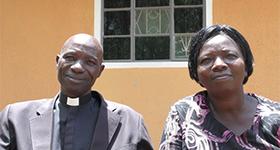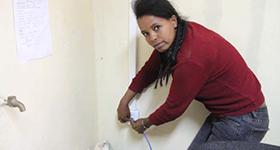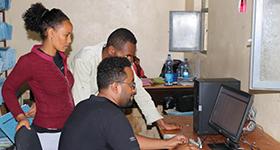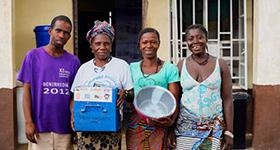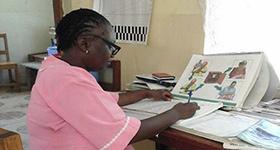Background
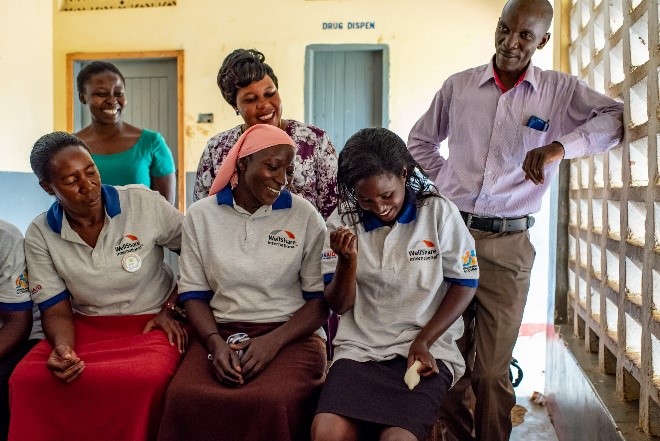
VHT members demonstrate self-injection during a supervisory visit to Bugweri District, Namunyumya HC II. Source: Laura Wando/WellShare International.
WellShare International is integrating subcutaneous depot medroxyprogesterone acetate (DMPA-SC) self-injection in six sub-counties of Iganga and Bugweri Districts, Uganda as part of its full and informed-choice family planning program. Community health workers, known as village health team (VHT) members in Uganda, and health workers offer injectable contraceptives within youth-friendly community-based family planning services. The WellShare program trained them to teach their clients to self-inject DMPA-SC.
Approach
In July and August 2018, WellShare conducted a refresher training for 70 VHT members and 18 clinic-based providers in four sub-counties in Bugweri and two in Iganga. Thereafter, VHTs and clinic-based providers were able to train willing clients who selected and were eligible to use DMPA-SC as their method to self-inject. After training and observed self-injection, clients got a simple leaflet with instructions, a calendar, and two DMPA-SC units to take home so that they could reinject themselves at the appointed time.
Providers were able to integrate counseling and training for self-injection into their existing service package for new and returning clients. Key aspects of the approach were: 1) provision of a simple leaflet and a calendar to help clients determine reinjection dates; 2) discussion with clients on safe storage options for self-injection units; and 3) identification of locally available safe disposal containers to store used units until clients returned to their providers.
Before she had self-injection training, a VHT member in Buyanga Sub-county in Bugweri had tried several times to give a sexually active14-year-old girl reproductive health information and counseling. The girl, Nakimera refused contraception because she was young and not yet married. However, when Nakimera was 17 she became pregnant. She had an abortion, but experienced complications and almost died.
After that experience, Nakimera found the VHT member who had talked to her a few years before and asked her for information and services so she could avoid getting pregnant again. The VHT had just finished training in self-injection and counseled Nakimera on contraceptive options. When Nakimera opted for DMPA-SC, the VHT member asked her if she would like to learn to inject it herself. Nakimera was excited and was able to inject herself on her first try. She took home two units for reinjection, a calendar to help her remember and calculate reinjection dates, and a leaflet illustrating the steps for self-injection. Nakimera is in secondary school. She finds self-injection convenient because she does not have to worry about taking contraception during school or missing school to return to the health center for her reinjection.
Results
Nakimera knew that many of her peers could benefit from the self-injection approach, which seemed preferable to seeking contraceptives from the health centers or VHT members’ homes. She convinced several of them to talk to the VHT member. The VHT member also meets the young women at a borehole when they come to collect water, educates them on reproductive health and family planning, and invites those who opt for family planning to come to her home for counseling and method selection. Fifteen of the young women referred by Nakimera opted for DMPA-SC and have been trained to self-inject.
However, self-injection at home is not always possible for DMPA-SC users. Some choose to self-inject at the VHT member’s home. They find self-injecting empowering, but they have nowhere to store the units and their parents are unaware that their daughters are using contraception.
Wellshare’s program is also contributing to the evidence base on self-injection. WellShare and FHI 360 are conducting implementation research to describe the experiences of DMPA-SC self-injectors, including the acceptability of self-injection among young women and discreet users, and a special study on waste management. Results will be disseminated later this year.
Lessons
- Self-injection eases family planning access for clients including youth.
- Positive peer influence through family planning champions is highly sustainable.
- Traumatic experiences sometimes prompt women, including youth, to make family planning decisions.
- Provider flexibility and friendliness can greatly improve community-based family planning services.
- Younger clients affirm the saying that “where there’s a will, there’s a way.” When a VHT member is willing to serve youth, these clients will go miles to find the assistance they need.

